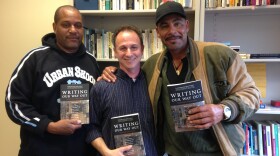Susan is one of about twenty students sitting around a table. She’s 48 and has long blue acrylic nails that match her shirt perfectly. It’s easy to notice them because her hands are shaking. She holds three typed pages, neatly stapled. Today, Susan is sharing her story.
Susan isn’t a college student. She’s part of a unique program in Richmond that is giving criminals an alternative punishment. Instead of serving jail time, they’re taking a writing class at Virginia Commonwealth University.
Coming to class, working on writing a personal memoir, keeping up with the readings and assignments. These are the things Susan has agreed to do instead of serving jail time for assaulting a police officer.
The small program began this semester with just a handful of participants. Alongside college students, the diverted inmates meet twice a week and are writing personal memoirs. Today is Susan’s turn to read out loud. We’ve agreed not to share her last name for privacy reasons.
Sharing a Story
Susan takes a deep breath and begins to read:
“I don’t remember the first time my biological father touched me sexually, I don’t know if I was too young or just blocked it out. I started to remember things happening around the time I was eight years old. Mom was working nights so she was never around. Of course when I was younger it was ‘Daddy loves you’ but as I got older it was ‘Don’t tell anyone or I’ll hurt you.’ He’d come into my room at night, have sex with me and leave as I just lay there in the dark cold attic room thinking to myself ‘What did I do to deserve this treatment?’
Susan has been reading quickly, rushed. She stops to take a deep breath and a young man sitting next to her slips her a crumpled tissue.
Her voice begins to break as she continues.
“Why couldn’t I just have a normal childhood?” she reads. “I let him do what he wanted because I was too afraid to do anything else. I would lay there and cry myself to sleep after it was over.”
Susan reads on for five minutes. She talks about her mother’s struggle to leave, her own difficult relationship with her sister, and the ongoing abuse in her life today.
When she’s done there’s a silence and Professor David Coogan speaks up.
“What was the hardest part about reading that for you?” he asks.
“What he had done,” Susan answers. “I don’t feel like I ever had a normal life.”
Coogan nods affirmatively, agreeing.
Class wraps up and the students and diverted participants file out. Many stop and give Susan a pat on the back or a word of encouragement.

Writing Their Way Out
For 15 years Coogan has heard difficult stories like this, ever since he first began teaching writing classes in Richmond City Jail.
The idea was to help people figure out what had led them to commit a crime.
“If I could help them write the story about everything leading up to that moment maybe they would want to write a new chapter in life where they could stay out of that trouble,” Coogan says during an interview in his office.
Since, Coogan has even co-authored a book with former inmates he worked with.
Through years of doing this work, Coogan says he believes people can “write their way out.”
“Can they stay out though?” Coogan asks. “Writing is insufficient for actually changing life, capital L. Because life is unjust. It’s not fair.
A Unique Partnership
This year, Coogan has taken his writing classes to a new level.
He says he had always been looking for ways to help keep people out of jail altogether, and the opportunity came along when he met Richmond Commonwealth Attorney Mike Herring.
Soon a partnership between the city, VCU, and Coogan was formed. The Commonwealth Attorney’s office flagged some some possible participants who applied with an application essay.
A handful were chosen and offered a plea agreement. In exchange for pleading guilty, the participants had to come to class on time, keep up, and participate. The class began with nine diverted inmates and six are successfully graduating this Tuesday. Those that didn’t wound up back before a judge.
Coogan also required VCU students to write an essay before signing up for the class.
“It takes a lot of work to get difference into a classroom, it doesn’t happen naturally,” Coogan says. “So whether it’s at a jail or in a college classroom people are thrilled to discover that they’re journeying in much the same ways through much the same struggles.”
Those similar struggles come into clear focus when the VCU students share their memoirs.
Conner Elmstrom is a student, twenty two years old. He’s graduating with a degree in English this May. He says he’s heard things in this class he would never have heard elsewhere, and in an odd way it’s actually made him feel better, more confident -- about his own story.
“I had gone through sexual abuse when I was younger. And it had been,” Elmstrom hesitates. “It had defined a lot of how I thought of myself.”
He says he closed himself off to people.
“My own problems I felt were my own. They weren’t any one else’s. Like I couldn’t relate to anyone,” Emstrom says. “And when you do a class like this you realize how wrong you are. And that’s really good.”
This report, provided by Virginia Public Radio, was made possible with support from the Virginia Education Association.


